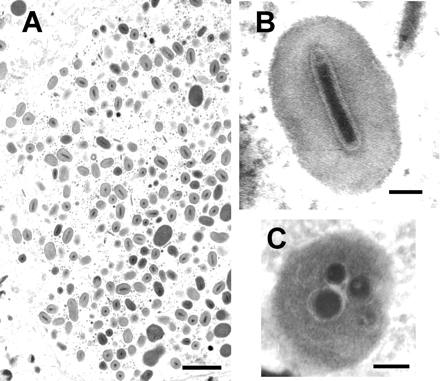Granulosis Virus
Classification
NCBI: Taxonomy |
Domain: Viruses
Group: dsDNA
Order: Unassigned
Family Baculoviridae
Genus: Betabaculovirus
Type Species
Cydia pomonella granulovirus
Description and Significance
Granuloviruses are in the family of insect viruses called the baculoviridae. These viruses target insects and are popular as insecticides for farmers targeting lepidopteran larva. The viruses are present in many historical records for causing silkworm 'jaundice' and have been used as biopesticides since WWII. There are currently 17 species in the genus betabaculovirus. These viruses are popular due to their selectivity of only attacking insects from the order lepidotera. Granuloviruses are well known for their unique ability to completely liquify their hosts in order to spread to more hosts, a trait they share with the closely related nuclear polyhedrosis viruses. The type species of granuloviruses is the species Cydia pomonella granulosis virus (CpGV), which only affects Cydia pomonella larva. C. pomonella larva are pests of various fruits in agriculture, causing great loss of ripened fruits. Granulovirus has been used as a pesticide since World War II (Federici, 1997); however, C. pomonella has been developing resistance to granulovirus since 2005 (Sauer, 2017). Granuloviruses are useful in the pesticide industry due to their ability to efficiently kill lepidopteran pests, such as C. pomonella, to protect crops without damaging them or harming the consumer of the crops. Extensive research is being done on more uses and applications of baculoviridae to operate as pesticides against more specialized or resistant lepidopteran pests.
https://microbewiki.kenyon.edu/index.php/Granulosis_Virus
above. godsmack voodoo


No comments:
Post a Comment